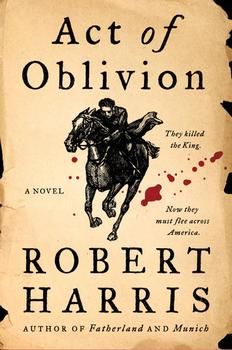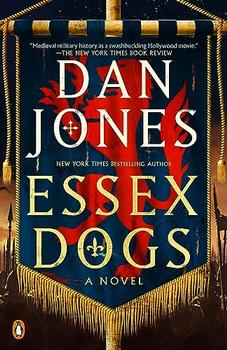Summary | Excerpt | Reviews | Beyond the book | Read-Alikes | Genres & Themes | Author Bio

A Novel
by Robert HarrisFrom the bestselling author of Fatherland, The Ghostwriter, Munich, and Conclave comes this spellbinding historical novel that brilliantly imagines one of the greatest manhunts in history: the search for two Englishmen involved in the killing of King Charles I and the implacable foe on their trail - an epic journey into the wilds of seventeenth-century New England, and a chase like no other.
"From what is it they flee?"
He took a while to reply. By the time he spoke the men had gone inside. He said quietly, "They killed the King."
1660 England. General Edward Whalley and his son-in law Colonel William Goffe board a ship bound for the New World. They are on the run, wanted for the murder of King Charles I—a brazen execution that marked the culmination of the English Civil War, in which parliamentarians successfully battled royalists for control.
But now, ten years after Charles' beheading, the royalists have returned to power. Under the provisions of the Act of Oblivion, the fifty-nine men who signed the king's death warrant and participated in his execution have been found guilty in absentia of high treason. Some of the Roundheads, including Oliver Cromwell, are already dead. Others have been captured, hung, drawn, and quartered. A few are imprisoned for life. But two have escaped to America by boat.
In London, Richard Nayler, secretary of the regicide committee of the Privy Council, is charged with bringing the traitors to justice and he will stop at nothing to find them. A substantial bounty hangs over their heads for their capture—dead or alive...
Robert Harris's first historical novel set predominantly in America, Act of Oblivion is a novel with an urgent narrative, remarkable characters, and an epic true story to tell of religion, vengeance, and power—and the costs to those who wield it.
Harris's choice to switch points of view between the colonels and Nayler works well for several reasons and gives the book its unique, humanizing flair. The technique allows him to make full use of both England and the American colonies as settings; between the multiple storylines, it is practically impossible for readers to get bored or guess what is coming next. During the London chapters, Harris adds another narrator — Frances Goffe, Whalley's daughter and William Goffe's wife. The author gives full access to the inner thoughts of all these characters, painting a fuller picture of the plot and people involved. This is the main advantage of Harris's approach: The story is all about the two sides of a war and the ways people on each side justify their actions. Beyond heinous acts of wartime violence, all of the male narrators also engage in torture and murder during supposed peacetime. Yet Harris depicts even scenes of violence with a poetic description that makes reading Act of Oblivion like watching a movie; everything springs from the page to the imagination...continued
Full Review
(590 words)
This review is available to non-members for a limited time. For full access,
become a member today.
(Reviewed by Maria Katsulos).
 When it comes to the execution of English royalty, perhaps the most famous are the two wives of Henry VIII who met their ends at the Tower of London — Anne Boleyn and Catherine Howard. The double execution of Louis XVI and Marie Antoinette by guillotine in France is equally if not more famous, and countless other royals have been killed by their enemies. However, only one reigning King of England has ever been publicly executed for treason: Charles I, or Charles Stuart, in 1649. This crucial event precedes the main plot in Robert Harris's Act of Oblivion.
When it comes to the execution of English royalty, perhaps the most famous are the two wives of Henry VIII who met their ends at the Tower of London — Anne Boleyn and Catherine Howard. The double execution of Louis XVI and Marie Antoinette by guillotine in France is equally if not more famous, and countless other royals have been killed by their enemies. However, only one reigning King of England has ever been publicly executed for treason: Charles I, or Charles Stuart, in 1649. This crucial event precedes the main plot in Robert Harris's Act of Oblivion.
Charles was the second son of James VI of Scotland (also James I of England) and Anne of Denmark. Charles's older brother, Henry, was primed to be the next king but fell ill ...
This "beyond the book" feature is available to non-members for a limited time. Join today for full access.

If you liked Act of Oblivion, try these:

by Lev Grossman
Published 2025
The #1 New York Times bestselling author of the Magicians trilogy returns with a triumphant reimagining of the King Arthur legend for the new millennium.

by Dan Jones
Published 2023
The New York Times bestselling historian makes his historical fiction debut with an explosive novel set during the Hundred Years' War.
Finishing second in the Olympics gets you silver. Finishing second in politics gets you oblivion.
Click Here to find out who said this, as well as discovering other famous literary quotes!